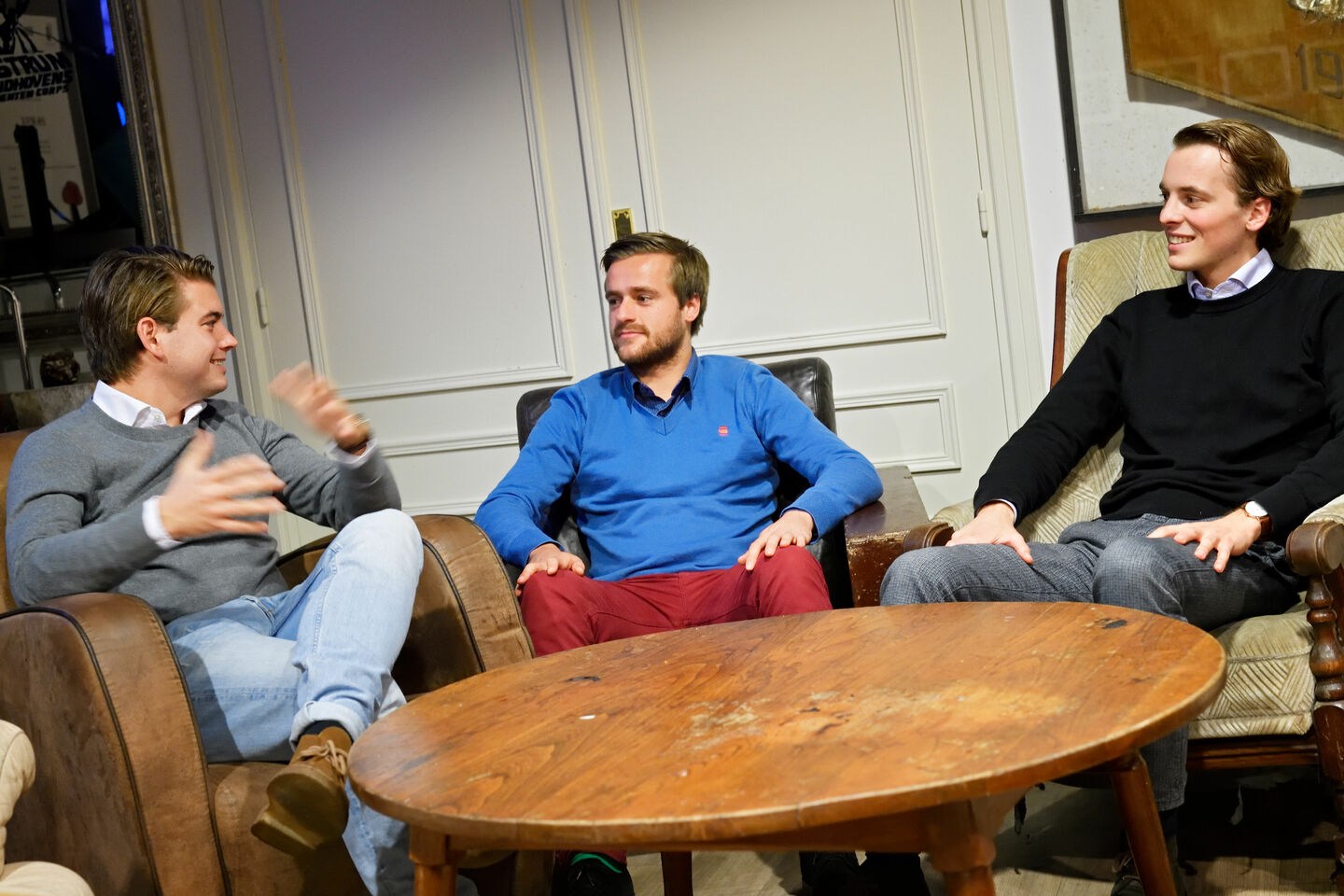
Being under attack, waiting it out - and moving on after #nietoo
At Ten Hagestraat 13 the telephone rings early on the morning of Tuesday January 23rd. “You guys are probably going to become national news today,” is the warning given by TU/e’s board spokesperson to the still slightly stunned Senate of the Eindhoven Student Corps. Before nightfall all hell breaks loose, as they say. The cause: a Carnival party planned by one of its 'disputen' (societies), on the theme ‘(a woman's will is irrelevant) #NieToo’. Close to eleven months later, three board members look back.
Yes, internally Aleph's invitation had already caused a stir, say former association secretary Sem Quaedvlieg, former president Jaap Peterse and his successor Job van Geest. Not in itself so surprising. “This commotion happens every year,” says Peterse. “They always try to hit on a topical social theme, be a little provocative, and draw attention with their invitation.”
Attention they would certainly get - more than the students would have liked. When on Thursday January 18 the invitation went public (including on Facebook), says Peterse, the Senate of the E.S.C was on high alert almost at once. “Really, this was beyond the pale”. He emphasizes, “As an association we don't in principle have anything to do with house parties, and we don't bear any responsibility for them. But in this case we did think, ‘This is something we are going to have to take action on’.” Because, as he puts it, “Apparently it was being regarded as a good prank internally at Aleph, and the members had perhaps been egging each other on a bit - but their social sensitivity was switched off.”
Former E.S.C secretary Quaedvlieg adds, “Obviously the joke was tasteless. But members, among them some women, did understand that it really wasn't anything more than a joke. Some of them wanted to go to the party dressed up as a cactus, in the spirit of ‘can’t touch me’”. “In terms of humor, it takes a lot to offend students and among themselves they can be quite harsh and coarse,” says Peterse.
Read on below the photo.
Nonetheless, that same Thursday evening after Aleph's party announcement had appeared, the Senate of the E.S.C gathered for a meeting. The wording of the invitation was amended somewhat following a subsequent email request sent by the association's board, and the days passed.
Until Tuesday morning when Executive Board spokesperson Barend Pelgrim of TU/e called; Cursor had seen a screenshot of the invitation and was determined to write about it. Peterse remembers the phone call all too well. “You guys are probably going to become national news today,” was the core of the message. And, anything but voluntarily: would the board members mind reporting that same day to the Executive Board.
Whereas, according to Pelgrim, the E.S.C was initially in a phase of denial (and the Senate presumed it had no any responsibility to carry here), at that point alarm bells were already ringing for Pelgrim. He speaks of an awkward combination of factors, of “the whole social attitude towards corps members, the #MeToo storm that was raging just then, all kinds of crap that had already been going on for a year at other corps in the Netherlands. I knew it: now it's our turn. You can play down your part until the cows come home, but then it's time to face the music”.
“We thought we'd taken our responsibility as the Senate with that mail to Aleph in which we clearly distanced ourselves from the theme and everything to do with it,” says Peterse. “But after that call, the stress hit us. We realized then: this isn't something we can explain away, we'll just have to take it.” After all, Pelgrim had made it very clear to the corps board at the outset: this is not an Aleph matter, it's you guys TU/e is dealing with. “If a football's lowly seventh team goes off the rails, it's still the football club that is called to account.”
Read on below the photo.
Tuesday afternoon at 4 o'clock, together with then president of Aleph Erik Koningen, the guys in charge of the E.S.C reported to TU/e Executive Board President Jan Mengelers and board member Jo van Ham. The atmosphere was tense, recalls Quaedvlieg. “They were furious,” says Peterse. Aleph foreman Koningen was in fact sidelined by the university administrators at the outset, as he himself says, “Mr. Mengelers made that very clear: ‘We are not talking with Aleph, but with the E.S.C.’ Without a doubt, his words and sanctions were aimed at us as an association.”
The main impression that has stayed with university spokesperson Pelgrim is, "that they were hugely strict with you guys: ‘You are in the wrong and you aren't going to talk your way out of it, end of story’. Jan in particular was extremely angry.” But concern was also expressed, recalls Quaedvlieg: about the apparently harder-edged student culture and humor, about how representative that is of the university as a whole, and what 'people' find acceptable.
“I don't believe a final conclusion as such was reached,” says the former secretary now. “But it was certainly clear: student life offers plenty of scope for personal development, to make mistakes and to prepare you for what comes next. And some people are better at judging the limits involved than others.”
Forty-five minutes of blistering reprimand later, the E.S.C representatives were out of the office - and saddled with a hefty set of sanctions: the E.S.C's board grants were frozen and the E.S.C was denied entry to academic ceremonies until further notice (in the end the association missed only this past opening of the academic year). And, perhaps even more importantly, it was clearly tasked with taking a long hard look at its own - and in general at - diversity, culture, identity and image. Peterse looks back on “a good talk, after which we had clearly defined, practical starting points for going away and doing something.”
But first of all the Senate was forced into crisis mode, tells Quaedvlieg. “It was all systems go. At a moment like that a huge amount of adrenalin floods through you.” In consultation with TU/e spokesperson Pelgrim a number of firm process agreements were made - from drafting a statement for the websites of both the E.S.C and Aleph to informing those directly involved. “We had to act before the Cursor article appeared, in particular notifying our members, reunion members and stakeholders.” Nearby residents of both the E.S.C association premises Ilium and the Aleph house also had to be informed, “because there might have been reporters at the door before long,” says Quaedvlieg.
Quick phone calls were also made to their own parents, he says. “I didn't explain right away exactly what was going on, but I did say that we had to take our responsibility for something that as an association we had not done.” Peterse, “My father was mainly keen to put things into perspective, ‘It involves a Carnival party, it is a joke.’ And he urged me strongly: stay calm, don't let yourself get wound up.” Present E.S.C foreman Van Geest adds, “I talked about it again later with my father and his main point was, ‘What can you learn from something like this?’ And he said, ‘When you're under attack, keep quiet and wait it out.’”
Read on below the photo.
Midway through that Tuesday evening Quaedvlieg emailed a statement about the events and sanctions to all E.S.C members, “totally watertight, totally correct” - while realizing: there's a chance this mail will do the rounds. And how. “Literally within eight minutes of its being sent, someone on the board of SSRE (another Eindhoven student social association, ed.) received it via his girlfriend in a dispuut in Maastricht,” tells Peterse. Screenshots of the mail were circulating on Twitter in no time, while on Facebook images of the announcement poster were doing the rounds.
That same night the ANP, the NOS and Nu.nl were already calling up and before breakfast the next morning the E.S.C and #nietoo were indeed national news - from the LINDA website to GeenStjil. Incidentally, the countless phone calls from journalists throughout the morning initially escaped the notice of E.S.C foreman Peterse; he was applying himself to an exam on campus, while his colleagues at Ten Hagestraat noted down names and telephone numbers. Did they want to take part in a talk show later that day, ran one request. The E.S.C refused. “We asked ourselves: do we have anything to gain? Clearly not,” says Quaedvlieg.
There were reporters who called E.S.C members on their cellphone numbers: “Hi, I am so-and-so, do you want to comment?” says Peterse. Armed with a camera, one reporter staked out the Aleph house on the Guido Gezellestraat, in vain, incidentally - curtains and doors remained closed. Besides, some of the nine residents had taken the precautionary measure of sleeping elsewhere that night, knows Van Geest; others had swapped the ground floor temporarily for the upstairs rooms.
Read on below the photos.
Peterse's telephone, switched off most of the morning due to his exam (which by the way he did not pass), would explode again at the end of the morning from the countless messages. “First off I called Barend and at his recommendation I stayed at TU/e instead of going to the association premises. That would only have started the media chasing us again.”
Just after noon he spoke to a couple of camera crews in MetaForum, including the crew from Studio040, which had already had an appointment earlier that day with Executive Board President Jan Mengelers. “Afterwards he asked me to drop by for a moment. I really appreciated that, him asking: ‘Are you handling it okay? Can I do anything for you?’ He thought we were doing a good job.”
Read on below the video.
That Wednesday was nonetheless intense, as Quaedvlieg and Peterse recall. It wasn't only journalists who were descending on the E.S.C; various readers were only too happy to put in their two cents' worth. “Ordinary people, sometimes with anonymous email addresses, who wrote: ‘We're gonna fuck you up the ass’.” But there was support too, says Quaedvlieg, in the form of reactions to news reports, in which readers wrote: ‘Surely you understand that this is a joke?’
On that evening's TV news, broadcast nationally by NOS at 8 p.m., #nietoo was given only a brief mention, “actually after 2 p.m. that afternoon the biggest hype was already over. Because, I think, we simply had a watertight story,” says Quaedvlieg. “The association was under fire, but there was also a lot of decisiveness and internal support.” Peterse continues, “We tried to weather the storm as best we could and then let it blow over. On Thursday evening we had a meeting with the Senate and we actually said at that point, ‘We've made a good job of this - now we have to look at what we are going to do in the coming period’.”
In any event, heading the to-do list was a visit to chief diversity officer Eva Demerouti of TU/e - and, in preparation for this, talks with both Aleph and the reunion members of this oldest Eindhoven dispuut, because the conclusion, according to Peterse, was clearly this: aside from the discussion whether or not #nietoo was a joke, “this is not what makes people here feel at home and it is at odds with the culture we have here.”
Quaedvlieg takes up this point, “Aleph too clearly had the feeling that they had something to make amends for.” Accordingly, he says, the dispuut did various good deeds after #nietoo, some for charities such as the Dutch Cancer Society (KWF). The dispuut was also invited to a debating contest between high school pupils at the Van Abbe Museum, an event that opened with ‘the #nietoo case’. With Aleph president Koningen as chair, pupils proceeded to debate such matters as how far you can take humor and satire, and when does something stop being funny.
Read on below the photo.
The interviews with diversity officer Demerouti also proved instructive and constructive, according to Peterse. “She was very curious about what lies behind our traditions and closed nature, really tried to get to know us.” At the E.S.C's invitation, Demerouti also spoke at the association's next public meeting. Held at the end of April, in the presence of TU/e administrators Mengelers and Van Ham, this meeting raised a diverse selection of questions and propositions.
“The Executive Board says, for example, that everyone must feel at home here in Eindhoven. My opening question was this: does everyone have to feel at home everywhere in Eindhoven?” says Peterse. It was an interesting and fruitful evening, says the threesome. “I think that Mr. Mengelers and Mr. Van Ham got to see that we are a very critical and diverse association, which is perhaps not always evident because our doors are pretty much closed,” says Peterse.
Additionally, the corps helped choose propositions for this year's Mystery Tour, the biennial day trip taken by the Executive Board and all the student boards. “During the Mystery Tour you can plant a seed in the top layer of each association to set them thinking about themes like this.”
The association also spoke with TU/e community manager Erik de Jong and this in turn led them to the Central Introduction Committee, relates Peterse. “Our idea was to have the Intro newbies ask each other on day one, what will make you feel at home here? This suggestion was supposed to be included in the training given to the Intro guides. Later, during Intro Week itself, we read in a Cursor article that Intro participants had asked each other this question. I thought that was good; that more or less made the circle complete for me.”
Those closed doors give people the space to make mistakes that they won't be called to account for right away
According to the former E.S.C board member, Eindhoven has “a pretty healthy student culture,” even when it comes to, say, hazing rituals, which have frequently caused a rumpus in cities like Leiden and Groningen. This is due in part to the levelheaded Brabant attitude, he thinks. And to, “The strong sense of a clique; the associations here are fairly small. Of course, like anywhere else, people here do crazy things at times, certainly when they've had a bit to drink. But they know each other and keep each other in check.”
Peterse says he understands that this might not be all that evident to the outside world, due to the closed nature of the association. “This is a conscious choice: those closed doors give people the space to make mistakes that they won't be called to account for right away. We want to offer an environment in which people can grow safely, by trial and error.” Van Geest adds, “That means you can do something dumb without being publicly shamed on the spot. There's an idea behind this: if you can keep your head above water here, you can do the same anywhere else later on in life”.
Read on below the photo.
Despite the atmosphere of trust and monitoring of one another outlined here, #nietoo has nonetheless prompted measures to be taken within the association as it has beyond it. The most concrete is the appointment of an ombudsperson to the Senate - assisted by a fellow board member who is a woman, in case members would rather talk to a woman. “How that will work in practice, we are leaving rather up to them,” says Van Geest. “The main thing is that our members know that should any problems arise, they can talk them over not only with their friends, but also with the association.”
In addition, some internal procedures have been amended and, for example, any plans the disputen have, including their party plans, will be checked in advance by the Senate. “That won't really be necessary,” thinks Peterse, “From now on people will think twice before acting.”
One thing that hasn't changed within the association is the humor, states Quaedvlieg. “Amongst themselves, the members still make harsh jokes. But it must be said that their social awareness has grown.”
That #nietoo has tarnished their reputation in some quarters, among them the E.S.C.'s Wikipedia page, is something these guys are resigned to.“A friend at Vindicat (the student corps in Groningen, ed.) joked, ‘Finally, you've joined our ranks’,” says Peterse. Not that they are trying retrospectively to laugh off the whole affair, the three hasten to add - it wasn't an enjoyable period by any means. But it was instructive. Crisis management, difficult discussions with the Executive Board, speaking to the press: formative experiences each and every one, says Quaedvlieg. “As the Senate, we were caught up in a storm not of our own making. And at some later date I'll talk proudly about that time.”
Job van Geest was not caught in the eye of the storm; he took over the presidential baton from Peterse only later this year. An ambition he cherished before #nietoo and that, he says, never wavered for a moment. “I thought, if you lose the desire to take on this responsibility now of all times, it means you simply aren't suited to the role. I support this association and what we do, and I want to project that.”
According to the threesome, the issue is seldom mentioned these days, except for the occasional joke in the E.S.C's own bar. “For a fleeting moment you are world news, then a day or two later it has all blown over,” says Van Geest. In any event, the #nietoo chapter, with the exception of this moment of reflection with Cursor, is closed for Aleph and the E.S.C, says Peterse.
Read on below the photo.
A line has also been drawn under the various sanctions imposed as a consequence of #nietoo. At the end of the day, the E.S.C forfeited 25 percent of its grant for this year; two of the four TU/e students on the six-strong Senate would normally each receive nine months at 290 euros in board grant. “Still, a lot of people had expected that we'd go back to 100 percent,” says Peterse. According to Pelgrim, however, the Executive Board chose to adopt its “hard line” after careful thought. “They didn't want to just send a message and go back to business as usual.”
But perhaps the measures that had even more impact were those imposed on Aleph by the E.S.C itself. The (nearly twenty) men of the dispuut were suspended as association members for four months, with the temporary loss of their voting rights, among other things. Nor was Aleph welcome, until the end of this past academic year, in the association's building on Ten Hagestraat. Not an easy sanction to impose, states Peterse. “We are talking about people who are actively involved in all kinds of committees, as first responders (BHV volunteers), people who are involved in all the association's goings-on. Some of them come here as much as three times a week, often for years on end. So it is pretty intense if you aren't allowed to come here for almost half a year.”
The book is now closed, he says - especially for Aleph, which didn't join in the conversation held with Cursor partly for this reason. The issue was intense for a short while; dealing with it was instructive for all those involved. “We have all moved on - with one another and with the university. No one feels resentful anymore.”


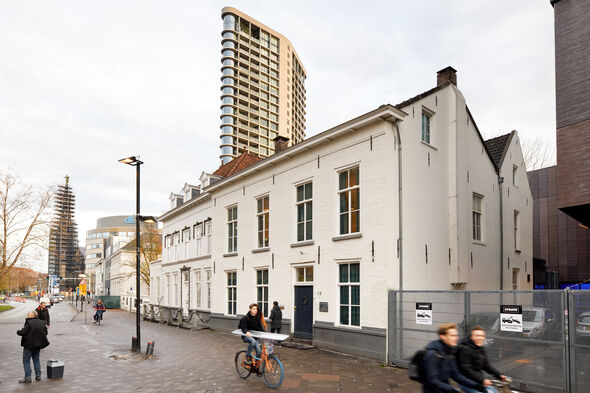
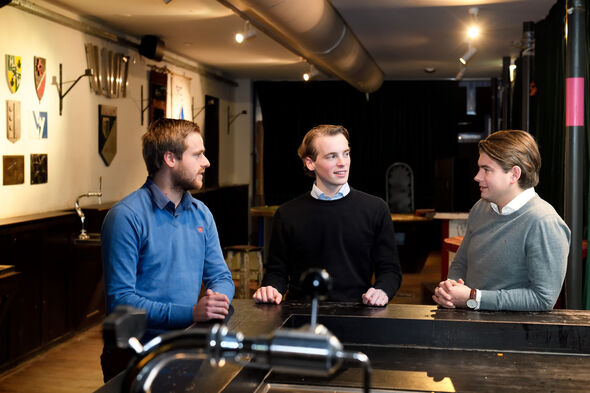
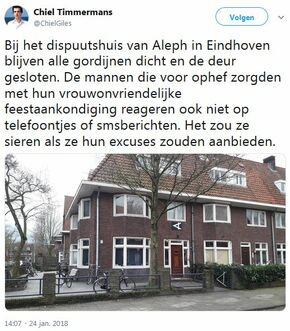
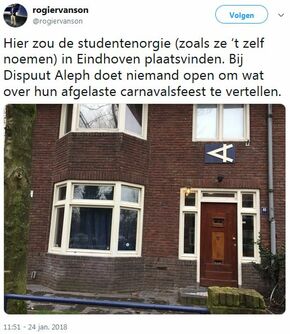
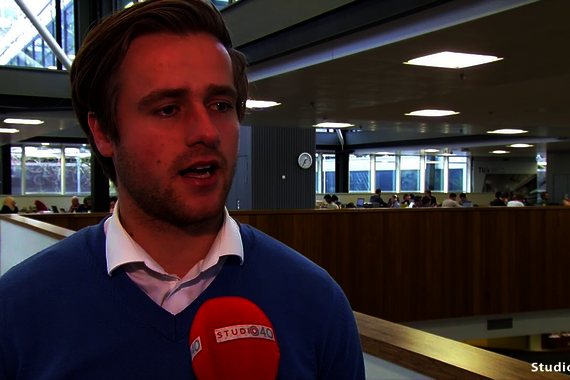
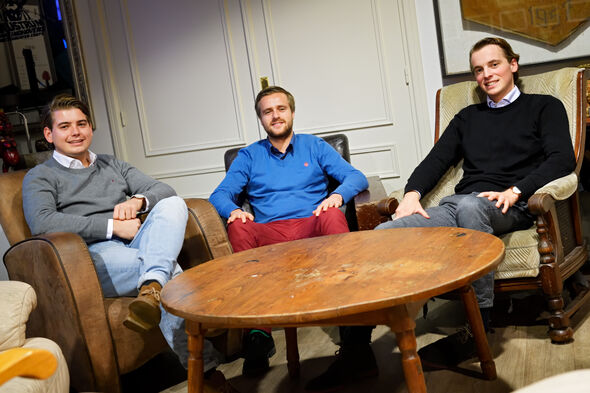
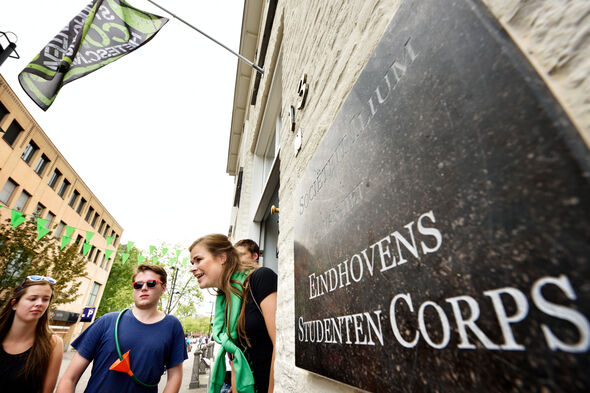
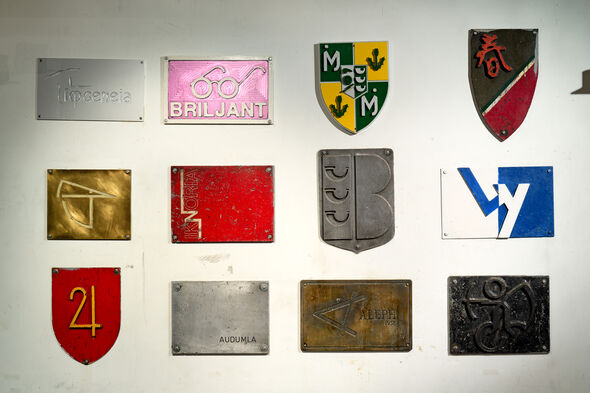
Discussion